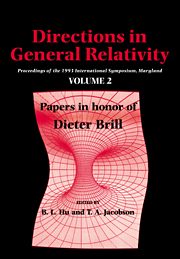 Directions in General Relativity
Directions in General Relativity Published online by Cambridge University Press: 06 January 2010
ABSTRACT
The problem of the origin of rotational inertia is examined within the framework of the relativistic theory of gravitation. It is argued that gravitomagnetic effects cannot be interpreted in terms of the relativity of rotation. Absolute and relative motion are discussed on the basis of the hypothesis that these are complementary classical manifestations of movement.
What is the origin of inertia? For instance, with respect to what does the Earth rotate around its axis? The rotation of a body does not generate any basic new gravitational effect in the Newtonian theory. This is not the case, however, in Einstein's theory of gravitation. The striking analogy between Newton's law of gravitation and Coulomb's law of electricity has led to a description of Newtonian gravity in terms of a gravitoelectric field. Any theory that combines Newtonian gravity with Lorentz invariance is expected to contain a gravitomagnetic field in some form; in general relativity, the gravitomagnetic field is usually caused by the angular momentum of the source of the gravitational field. The first gravitomagnetic effects were described by de Sitter soon after Einstein's fundamental work on general relativity. The question of relativity of rotation was also discussed by de Sitter following his investigation of the astronomical consequences of Einstein's relativistic theory of gravitation; de Sitter concluded that the problem of inertia did not have a solution in the general theory of relativity.
To save this book to your Kindle, first ensure [email protected] is added to your Approved Personal Document E-mail List under your Personal Document Settings on the Manage Your Content and Devices page of your Amazon account. Then enter the ‘name’ part of your Kindle email address below. Find out more about saving to your Kindle.
Note you can select to save to either the @free.kindle.com or @kindle.com variations. ‘@free.kindle.com’ emails are free but can only be saved to your device when it is connected to wi-fi. ‘@kindle.com’ emails can be delivered even when you are not connected to wi-fi, but note that service fees apply.
Find out more about the Kindle Personal Document Service.
To save content items to your account, please confirm that you agree to abide by our usage policies. If this is the first time you use this feature, you will be asked to authorise Cambridge Core to connect with your account. Find out more about saving content to Dropbox.
To save content items to your account, please confirm that you agree to abide by our usage policies. If this is the first time you use this feature, you will be asked to authorise Cambridge Core to connect with your account. Find out more about saving content to Google Drive.